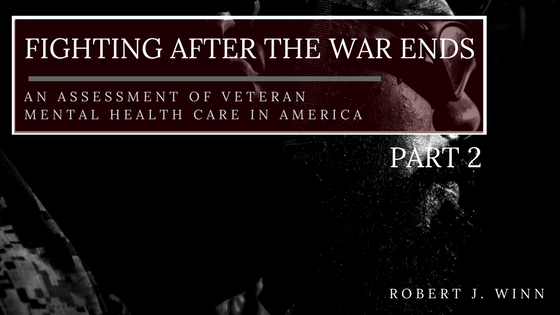Military patients with post-traumatic stress disorder struggle with severe nightmares, flashbacks, social avoidance, hyper-vigilance, and often self-destructive behavior tendencies upon returning from combat. These are real and very treatable symptoms, but some patients falsely blame themselves for their conditions. Military psychologist William P. Nash and Boston University researcher Brett Litz put it well in their published examination of the origin of mental health stigma in the armed forces:
Particularly during wartime, young men and women volunteer to join the military partly because they want to prove themselves in the field of battle. To the extent combat is conceived to be a personal test, the negative impact on self-concept and self-esteem of perceived failure may be great. Furthermore, conceptions of mental disorders as emblematic of personal weakness that have fueled the prejudices of social stigma were born and nurtured in military services in wartime.
For a soldier – and particularly for a young soldier – the issue of mental health is thus turned inward and felt to be one they are responsible for privately eradicating. In this damaging mindset, open treatment is seen not as a means to rehabilitation, but an admission of weakness.
Unfortunately, the tendency towards repression can leads veterans to manage their physical and emotional pain through unhealthy means. According to statistics provided by the VA, 2 out of every ten veterans suffering from PTSD also struggled with substance abuse disorders, and that men under the age of 25 are more likely to take up drug or alcohol use as a means to manage their physical and emotional pain. Moreover, those who do face SUD and PTSD concurrently are significantly more likely to have problems adapting to life at home; they may not be able to keep a job, maintain relationships, or manage physical pain stemming from combat injuries. When laid out in numbers, the case becomes clear: mental health is a serious problem for veterans. We cannot expect them to handle their struggles alone, or require them to fight against a stigma to receive care.
Steps are already being taken to remedy the current situation. In a press release, VA Chief Consultant of Medical Services Dr. Antonette M. Zeiss noted that a greater emphasis on recovery has resonated through VA medical centers. Zeiss comments: ” The VA is transforming its mental health services to reflect the concepts of recovery with the ability to live a full and meaningful life and to be a key participant in developing one’s own recovery treatment plan.” According to Zeiss, these efforts include making mental health services available at primary care facilities to circumvent the stigma affiliated with visiting a specialty site and boosting mental health education programs for families.
The level of community support a soldier receives upon his or her return has been proved to be directly related to their chances of developing a mental illness after their tours. We need to tear away the stigma surrounding mental health treatment in the military, and instead create a culture that prioritizes recovery; where those in service know that they will have all the encouragement, support, and understanding they need to return to life at home. A quick “Cheer up!” isn’t the response veterans need or deserve after their time in service. We need to be there, to listen. Within time, the empathy and support we share will make all the difference.


